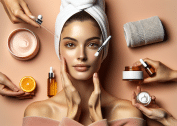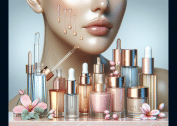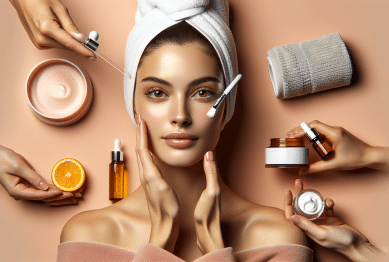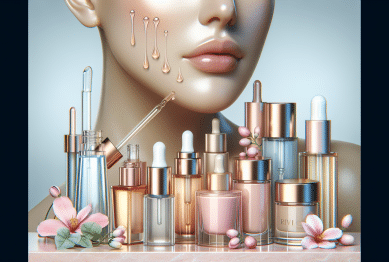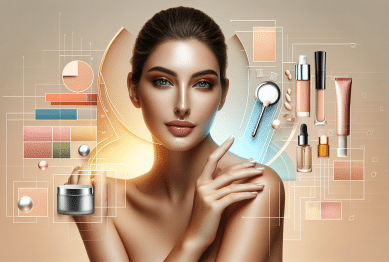Explore how evidence-based skincare routines can rejuvenate your complexion and support lasting wellness. This detailed guide dives into effective habits, trending ingredients, and mindful lifestyle tweaks that support healthy, confident skin without overpromised results or filler advice.
Understanding Evidence-Based Skincare and Its Value
Many people begin their skincare journey unsure if products will provide the effects they seek. Evidence-based skincare shifts the focus to routines supported by dermatological research, emphasizing ingredients with proven benefits like retinoids, ceramides, and antioxidants. When adopting an evidence-based approach, individuals gain insights into how skin functions and learn which interventions are thoughtfully supported by clinical trials or peer-reviewed studies. This offers greater clarity when navigating the crowded beauty market and can help users bypass hype-driven fads in favor of productive, science-supported results.
Skincare routines have evolved from simply cleansing and moisturizing to encompassing serums, exfoliators, and targeted treatments. The allure of ‘active ingredients’ such as peptides, vitamin C, and hyaluronic acid remains strong. What sets evidence-based skincare apart is the importance of peer-reviewed efficacy—meaning ingredients and techniques have demonstrated specific results in controlled studies. Reliable sources like the American Academy of Dermatology (AAD) or NIH provide updates on new research that help dispel common myths and inspire confidence in your routine selection (https://www.aad.org/public/everyday-care/skin-care-basics/care/science-backed-skin-care-tips).
One practical outcome of evidence-based beauty? Understanding that good skin health can be achieved without harsh marketing or bold promises. Instead, clinical evidence supports steady, consistent care—such as regular use of sunscreen or gentle cleansers—to maintain skin’s appearance and health. Many individuals report a renewed sense of confidence after shifting focus to these well-established habits. And the process can be empowering: gaining knowledge about what supports and protects your skin can feel like reclaiming control over your own wellness journey.
The Power of Ingredients and Formulations Backed by Research
A few key ingredients have repeatedly shown measurable results in scientific literature. Retinol (a type of retinoid), for instance, has been clinically demonstrated to support skin renewal and lessen the visible appearance of fine lines. Hyaluronic acid is beloved for drawing water to the skin and improving hydration levels, making it ideal for those seeking plumper, more refreshed-feeling skin (https://www.ncbi.nlm.nih.gov/pmc/articles/PMC4976400/).
Ingredient selection alone does not guarantee results—formulation matters too. Even high-quality vitamins and acids might underperform if not properly stabilized or combined. Research has revealed that vitamin C, for example, is best delivered in serums formulated to minimize light and air exposure, enhancing penetration and effectiveness (https://www.ncbi.nlm.nih.gov/pmc/articles/PMC5579659/). It’s helpful to consult reputable databases or dermatologist guides when interpreting product labels. A deeper appreciation develops for how and why specific combinations drive improvements in tone, texture, and radiance.
Some trending ingredients catch fire on social media long before being verified in formal trials. For instance, niacinamide commands attention for soothing sensitive skin and balancing oil production, but only studies with controlled parameters can confirm such claims. Evidence-backed routines prioritize these kinds of established components alongside reliable information from licensing bodies and long-term studies. Over time, this approach may reduce frustration, help make more cost-effective purchases, and—in some cases—deliver more lasting results.
Mindful Skincare Habits That Make a Difference
Developing mindful habits begins with personalization. Not every skin responds the same way to a product or technique, which is why patch tests and gradual introduction schemes are consistently recommended by dermatologists. Gentle cleansing, consistent moisturizing, and applying broad-spectrum sunscreen form a foundation suggested for nearly all skin types and tones. These practices are widely endorsed by the Skin Cancer Foundation and dermatology associations as first-line defenses against premature aging and sun-related damage (https://www.skincancer.org/blog/sunscreen-facts/).
Building skincare rituals into daily routines doesn’t need to be complex. Simple behaviors, such as thorough evening makeup removal, reapplying moisturizer throughout the day, or using gentle exfoliation once or twice weekly, can feel luxurious while remaining rooted in science. Stress management practices—like meditation and adequate sleep—also play an underrated role in skin health by supporting repair mechanisms and lowering cortisol, a hormone shown to affect inflammation and pH balance on the skin’s surface (https://www.cdc.gov/niosh/docs/2020-123/pdfs/2020-123.pdf?s_cid=3ni7d2n82noq).
Consistency is cited as one of the strongest predictors of skin improvement. Products delivering long-term benefits—like SPF, retinoids, or barrier creams—require regular, persistent application. Skipping a week of sunscreen or sleeping in makeup can destabilize progress. Therefore, incorporating these mindful behaviors into daily life aligns with how clinical trials are often conducted: over periods of weeks or months with routine check-ins and realistic timelines for change. Focusing on steady, cumulative improvements brings sustainable skin health within reach for many.
Lifestyle Choices and Their Impact on Your Complexion
Skincare doesn’t end with topical products. Nutrition, stress, sleep, and even environmental exposure contribute to how skin feels and looks over time. Smoking, excessive alcohol, or high sugar intake, on the other hand, have well-documented associations with dullness, wrinkling, and delayed healing (https://www.hsph.harvard.edu/nutritionsource/nutrition-and-skin-health/).
Hydration plays a significant role in wellness and beauty. Consuming sufficient water helps keep the dermis plump and assists in toxin elimination. Some research even links hydrated skin with a more even tone and fewer signs of irritation. Sleep, meanwhile, gives the skin time to undergo repair, and chronic lack of sleep has been identified as a contributing factor to increased fine lines and uneven pigmentation. Protecting skin from pollution by washing the face after spending time in urban environments or heavily trafficked areas is another key lifestyle step.
Reducing stress levels may indirectly enhance skin appearance. The body’s stress response can manifest externally, contributing to conditions such as eczema, psoriasis, or adult acne. Strategies like deep breathing, regular exercise, or even structured support groups are suggested by wellness experts for their positive effects on mood and overall skin quality. Slowly, lifestyle mindfulness and intentional choices turn into visible results, supporting both wellness and confidence over the long term.
Understanding Trends Versus Science in Skincare
The wellness and beauty industry often moves faster than clinical evidence. For instance, the recent excitement around glass skin or slugging (using a thick occlusive layer overnight) brings up important questions about suitability, safety, and skin diversity. Exploring these trends with a science-first lens can help manage expectations and avoid counterproductive side effects (https://www.fda.gov/cosmetics/cosmetic-ingredients/how-safeguard-your-skin-finding-facts-about-cosmetic-products).
Many viral ingredients and miracle claims lack the support of controlled studies or carry details that aren’t always broadcast—such as risk of irritation or the need for specific application techniques. Official organizations and clinical studies can help separate hype from credible recommendations. Reviewing ingredient safety, allergic potential, and real efficacy empowers better choices. Resources like the Environmental Working Group’s Skin Deep database or FDA advisories can be solid starting points.
That said, some trends do emerge from sound research and can even highlight overlooked routines. Layering products or using targeted treatments, for example, can support multi-dimensional skin health if routines are customized and supported by solid information. Ultimately, curiosity drives the beauty industry forward. Remaining open yet discerning, and learning which routines are safe and supported, creates a balance between self-expression and wellness you can trust for the long haul.
When to Seek Professional Guidance for Your Skin
There is great value in self-education, but some situations call for professional support. If experiencing unexpected reactions, persistent irritation, or new growths, consulting a dermatologist allows for more accurate diagnosis and treatment. These specialists can assess unique skin types, offer patch testing, and explain the science behind prescription interventions when needed (https://www.aad.org/public/diseases/a-z/skin-care-guidelines).
Professional-level treatments can also supplement at-home regimens for those interested in peels, microdermabrasion, or laser therapies. Clinics operating under the guidance of certified professionals are equipped to evaluate medical history, existing routines, and aesthetic goals before making recommendations. As advances in technology and research are made, new options like LED therapy or injectable treatments become available, always best approached with caution and open communication between provider and patient.
Periodic check-ins with a licensed provider offer an evidence-based perspective on evolving skincare needs. Life circumstances—such as pregnancy, menopause, or even seasonal shifts—can require updates to routines. Dermatologists help sort myth from fact and maintain a focus on safety, individualized care, and long-term wellness. Knowing when to seek guidance and how to interpret professional advice makes you an active participant in your health, ready to make informed and confident skincare decisions.
References
1. American Academy of Dermatology Association. (n.d.). Science-backed skin care tips. Retrieved from https://www.aad.org/public/everyday-care/skin-care-basics/care/science-backed-skin-care-tips
2. Fox, L. T. et al. (2016). Hyaluronic acid: A key molecule in skin aging. Dermato-Endocrinology, 4(3). Retrieved from https://www.ncbi.nlm.nih.gov/pmc/articles/PMC4976400/
3. Pullar, J. M. et al. (2017). The roles of vitamin C in skin health. Nutrients, 9(8), 866. Retrieved from https://www.ncbi.nlm.nih.gov/pmc/articles/PMC5579659/
4. The Skin Cancer Foundation. (n.d.). Sunscreen facts and guidelines. Retrieved from https://www.skincancer.org/blog/sunscreen-facts/
5. Harvard T.H. Chan School of Public Health. (n.d.). Nutrition and skin health. Retrieved from https://www.hsph.harvard.edu/nutritionsource/nutrition-and-skin-health/
6. U.S. Food and Drug Administration. (n.d.). How to safeguard your skin: Finding the facts about cosmetic products. Retrieved from https://www.fda.gov/cosmetics/cosmetic-ingredients/how-safeguard-your-skin-finding-facts-about-cosmetic-products


